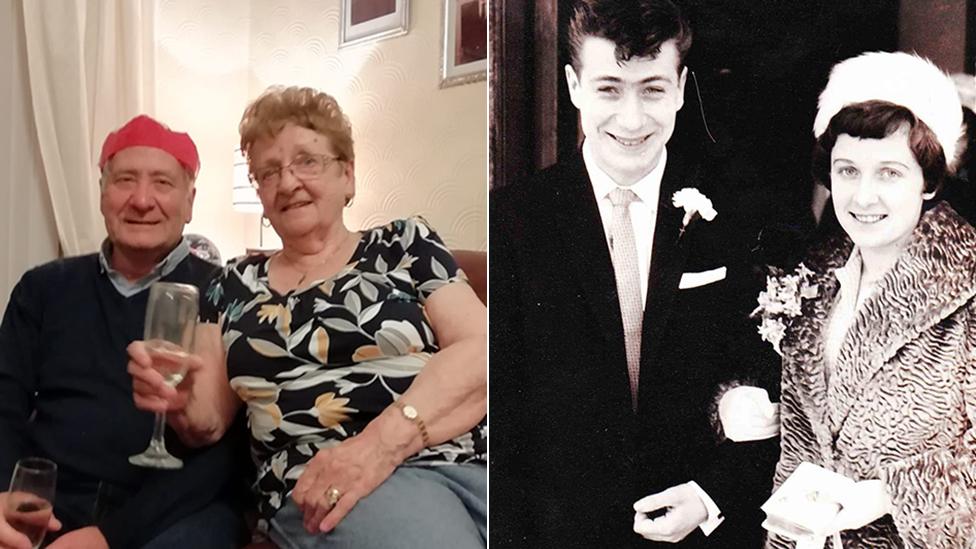Coronavirus: Lockdown causing 'acute grief' for bereaved
- Published

Vic and Maureen Sharp had been together for 58 years
The pandemic is causing "acute levels of grief" among people who have lost members of their family, a Scottish bereavement charity has said.
Cruse Bereavement Care Scotland says the restrictions on funerals and social contact mean people cannot grieve in a normal way and move on.
The Scottish government has published a timetable for lifting restrictions.
However, it is likely to be many weeks before wider groups are allowed to attend funerals.
Last month, Yvonne Sharp, from Oakley in Fife, lost both her parents within the space of a single day.
"The whole family's devastated," said Yvonne.
"My mum and dad never thought in a million years that they would get it, and I didn't think they would get it."
The government had advised Vic and Maureen Sharp to shield themselves.
'They weren't scared at the beginning'
The couple were both 74 years old. Vic had been treated for lung cancer last year and Maureen had a lung condition.
Yvonne believes that by the time the shielding letter arrived, it was too late. She thinks they caught the virus on their weekly trip to the supermarket.
"They weren't scared at the beginning and the older generation don't listen to you, basically," she said.
"Once they got the letter they said yeah, we have to stay in now. I feel that had they got the letter more quickly, they would have stayed in quicker."
Vic soon developed a cough and Maureen a fever and a sore back. They were taken to hospital but could not be saved. Maureen died on 8 April, and her husband died the next day.
Funeral cortege
"My dad just gave up," said Yvonne. "He'd been with mum since he was 16. They were together for 58 years. He couldn't do anything for himself. Old school."
Only six members of the family could attend the funeral. Villagers lined the streets to pay their respects and a piper led the funeral cortege through the streets of Oakley.
"My whole world's changed," said Yvonne. "I find it hard to speak about. We're in limbo.
"We can't console each other. I'm finding it hard, very hard."
Cruse Bereavement Care Scotland says calls to their national helpline dipped when the lockdown began, but have started to increase again.
The organisation said it was hearing from people who are more distressed than before.
Feelings of guilt
Volunteer counsellor Janet Watson said: "At the moment we are seeing acute levels of grief.
"Initial calls to the helpline usually last about 15, 20 minutes. At the moment those calls are going on for an hour.
"People are really desperate to talk about what's happening to them and they're calling us."
Ms Watson said people were finding it difficult to grieve in a "normal way" and were talking about the guilt they felt at not being able to be with loved ones when they were dying in hospital.
"Generally there's a feeling of not being able to get on with their lives, of being stuck," she added.
More than most, Yvonne Sharp knows the heartbreak this pandemic has caused, but she welcomes the prospect of greater freedoms as the lockdown is gradually lifted.
"Just to have company would be good, but there should still be social distancing. It's that happy medium - still protect yourself and watch what you're doing."

LOOK-UP TOOL: How many cases in your area?
GLOBAL SPREAD: Tracking the pandemic
RECOVERY: How long does it take to get better?
A SIMPLE GUIDE: What are the symptoms?
